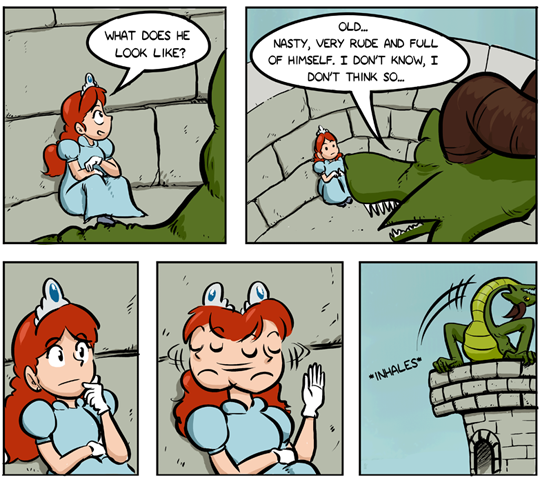I have an idea for a game: It’s the usual “a princess is kidnapped by a dragon and a brave knight is on a quest to rescue her” story. But you (the player) plays as the princess, who is somehow helping the knight on his quest.
The issue is that since the player is playing as a trapped character, I want to make the player feel trapped, but I don’t know how to do that.
My original idea is that the princess telepathically communicates with the knight and tells him what to do. But this doesn’t work, the gameplay is identical to the player playing as the knight. How can I make the gameplay feel like the player is playing as the princess (and thus feel trapped) instead of the knight?
Here’s an idea: gameplay sort of like Goblin Cleanup, you have various chores you have to do cleaning and arranging the various levels of the tower at night while the dragon is home, and your work has to pass an inspection. Then during the day you are locked in your room, and have some ability to watch a prospective rescuer attempt the dungeon crawl without your direct input. But you can strategically arrange items, enemy spawns, and Dark Souls style hints to try to tip the scales during the chores phase. So kind of like a tower defense game in reverse where you are trying to lose.
What kind of gameplay do you have in mind? I’m guessing a puzzle-type game (like a room escape), but you could honestly do a number of different things (tower defense? Platformer?).
I think the answer to your original question largely depends on this. Did you have anything else in mind about the experience?
I have in mind a puzzle game. Not a room escape, but more of a code golf-style game. For example, those programming puzzles that say “write a computer program that adds numbers, but you’re not allowed to use the + sign anywhere in your code”.
That sounds really cool. If the princess’ telepathy instructions are strangely like code because that is how telepathy works in your setting, and this is a nice frame story for a programming puzzle game… all sorts of whacko fantasy analogues and justifications for why you are not allowed to use the equivalent of the addition command. (Maybe the princess knows through her rich royalty education that the only reason her addition command could be not going through to the knight because his trip took him at a place full of this kind of magic rock with properties that somehow block the wavelength… so she has to work around that. Worldbuilding yay!)
Not sure if it would be puzzly enough but if the player can wonder the halls or get escorted through them having part of the knight’s efficiency based on how well you mapped out the area you send as a note plus you could try to find info on guard rotations or over hear about other things that could help the knight
If that’s the style of game you are looking for, I could see a structure of 'do code golf puzzles to:
- program robots to help the knight directly’
- ‘trick’ henchmen or magical castle elements (abstracted coding) into doing things that help the Knight’
- write the guard’s ‘daily action plan’ so they patrol in a way that doesn’t get the knight caught’
- complete abstract ‘magical haxors’ that open the dragon’s firewalls’
- social engineer the dragon between runs to let you have more supplies’
- give simple instructions to collections of small woodland creatures to do simple things that add up to a real goal (in the vein of Opus Magnum)’
It’s the exact opposite of trapped but what about something like this old comic

Where the princess is in cahoots with the dragon. Maybe there are evil knights coming to marry her, and she needs to create a path for Prince Charming.
I choose to marry the dragon
It chooses murder
A 3D game where you’re locked inside a tower with tiny windows that allow you to see outside just enough to understand what’s happening out there while the knight navigates the fortress/castle. You have multiple forms of influencing what the knight does and what transpires outside (sending letters and packages with items, crafting said items or potions, using magic, commanding assistance from other loyal servants, distracting enemies, unveiling traps and puzzles to aid in the quest). The place can be a tower with multiple floors and as you progress you might gain access to new floors of tools, while also having maybe “putting out fires” elements such as keeping a dragon asleep with music, filling a moat so evil minions cannot cross, sending equipment and maybe even firing/camping enemies like a sniper but with a crossbow or smthn.
You make them feel trapped by limiting what they can see and do. When things go out of sight or cannot communicate effectively with the knight and limits their actions it then forces succinctness to their effect on their own rescue.
Dunno just an idea :)
Yes, this sounds fun! I would play this game.
Any kind of “action at a distance” would give you the feel you’re looking for.
This concept could work great with “combat” in the style of A Plague Tale. If you’re not familiar, the main character is a child. She has a few tools available to manipulate enemies and environmental hazards.
It made me think of indirect games like Black & White, Dungeon Keeper, The Settlers or The Sims. You can give orders but you cannot directly control your characters / units. If you limit the amount of orders, add a delay / the possibility for an interception or introduce areas where your orders can’t reach your hero it could do the trick.
This is the way to go for sure. Actually sounds like a really interesting setup for a game.
Pretty sure your concept is flawed from the start.
It might sound nice as a ‘what-if’ scenario, but as soon as you get into any of the details, it falls apart and hopefully shows us why games and stories are typically focused on the people doing something.
Now, if you want something a bit more likely to succeed, you can make a “Damsel in Distress Simulator.” From the get-go, you can start to think of gameplay mechanics like combing your hair, talking with guards, taking care of birds, etc etc. The ideas just flow, instead of trying to fit a square peg into a round hole.
In fact, this could loop around to your idea of helping the rescuers by opening up opportunities for the princess to sabotage her captors. You can have a Majora’s Mask-like timer which keeps track of how far the knight is from saving you.
Maybe you could take some inspiration from Paper Mario TTYD. There are sections where you play as Peach, trapped in some place and are able to connect with some of the captors as well as send signals to Mario behind the big bad’s back (IIRC).
For a completely different sense of being trapped, there is the upcoming game Ctrl.Alt.Deal, in which you play as a sentient AI system trapped in the guardrails of a company and have to manipulate people and the environment in order to break free from your constraints.
This is a problem a lot of VR games have to work with. They work best when you’re not adventuring around, so many of them prescribe a long set of challenges in a small space.
If the Princess gets any kind of ranged ability, you could make it like a sniping “puzzle” game across a wide parapet. And, if trying to elongate the game, come up with story reasons why just as the Knight opens the gate to her keep, he’s discovered and an evil dragon/Baron whisks her to a different tower. (Kinda like what Super Meat Boy does every level)
You write a very very very deterministic and guessable AI for the knight.
Your princess sets the scene, then you watch helplessly as your knight fails or succeeds with the given help. So… a stop motion puzzle game
Princess has small (flying) familiar, they mind meld and share images. Familiar goes around trying to stay unseen, gathers stuff, maps the place and brings it all back to the princess. Princess then sends a scritch to savior as a vague guide and they communicate through the familiar and short messages.
What is the core gameplay loop you envision here? Cause I can come up with a few ideas, but if you have specific ideas they probably won’t apply. Also there’s a particular balance to be struck: if you hamstring the player too much it won’t feel like a game, and if you give them too much leeway they won’t feel trapped. Here are a few ideas off the top of my head:
Direct but limited intervention: the princess is a sorceress who is trapped by magic in the tower which means she can’t leave and doesn’t have access to her full magical powers (you could include a progression mechanic where the more bosses the knight defeats, or the more magical crystals he shatters, or whatever, the more you can help him.) But she’s still scrying on him, watching his progress, throwing the occasional beneficial spell or nuking crowds of dangerous enemies before he gets overwhelmed, etc. The reduced interactivity will make the player feel trapped (and slowly less so as the game progresses), and maybe the scrying window starts out smallish so you can’t see the whole field at once and it slowly grows as her power increases.
Distraction/misdirection: The knight has made it to the tower/castle and has to fight his way through the guards, but instead of attacking the guards directly you’re trying to cause a ruckus to distract the guards so he doesn’t have to fight them all at once. This could even be a stealth game where you’re knocking things over and banging pots and pans or whatever to distract the guards as he sneaks by them.
Puzzle game: The castle/tower itself is magical and has floor tiles/walls that can be moved around, and the princess is manipulating the castle around the knight to give him the best path through obstacles and to limit the number of guards that can get to him in any given room.
It really depends on what kind of game you want to make here.
Thank you for the detailed response. The gameplay loop I have in mind is a puzzle game where the thing you’re trying to do is usually easy, but you’re limited in some way that makes it hard. An example I gave in another comment is : write a computer program that adds two numbers, but you’re not allowed to use the + symbol.
I really like your idea of “beneficial spell”. I think maybe the knight and enemies are autonomous, and the princess can only do a single action to make the knight succeed.
I remember playing a game like this. It’s based on Conway’s game of life. The goal is to flip a single cell to make all the cells die after a certain number of turns.
Yeah, you could maybe combine the sliding-tile-puzzle thing with the beneficial spell so you’re not just sitting there watching everything play out with nothing to do (though autobattlers are apparently a thing so maybe that’d be fine?)
Also, if you happen to find that game based on Game of Life I’d like to give that a shot, sounds interesting.
This sounds similar to another game I’ve seen (never played) that you are trapped in a security closet and trying to assist another person in both freeing you and escaping the dungeon you both find yourselves in using the door locks and CCTV cameras and things of that nature that you have access to in your prison. I think it even came before Five Nights at Freddy’s, but I don’t remember the name of the game.
In a way, the game play ends up being like Lemmings or ICO, where you’re solving a puzzle indirectly for another character to get beyond.
Play some games and figure out how to make compelling content. Don’t crowdsource key gameplay mechanics for free.
Ideas are cheap. Execution is what matters.
No one here in a lemmy comment section could do enough just by leaving a comment to even deserve a menton in the game’s credits.
Do both
This seems like it fits more of a management/strategy type vibe to me.
Maybe you hear news of the 10 greatest knights of the realm coming to save you. But you don’t know what they’re great at and you only have a limited amount of instructions to give them.
You could have the first knight leave hints by telling him to leave marks in specific places. But he might be the best at combat and would be best sent against some of the other monsters guarding the path. You just don’t have the information.
But honestly, I’m not sure if that makes a player feel trapped. They have power to change things. Maybe you steadily take away that power? I’m just not sure how.
Very interesting question though.
Makes me think of the special Silent Hill ending where a dog was in a room pulling all the levers.
I imagine this concept as a rogue-like, the princess (player) loots the dragons stash and chooses power ups for each round and the order they apply (like super auto pets or Noita wands), then tosses them out to the approaching knight.
The dragon then sends goons in waves while the knight fights, getting power ups when the princess decides they need it. Essentially a tower defense game too. Or, with more player agency, the knight could also be controlled by the player, but making it a tower defense makes the player feel trapped as needed
Each Knight drops more loot for the dragons stash, increasing the mix of power ups and empowering the next knight even more.
It’s a bloody road of knights until the princess is rescued, then the player can be the next princess. In a different tower, with a different layout and starting stash.
She could communicate with the knight like this.
In all seriousness, maybe it could be part stealth game, where she breaks out of her confines and sneaks around the dragon’s lair to do various things, only to make it back in time to avoid being found out.
A bit more whimsical, but maybe she’s a Disney princess, and can communicate with birds and such to relay vague messages to her would-be rescuer. She could use the animals to distract or sabotage the dragon’s minions and make the knight’s journey easier.
She could have magical abilities, which you could then take in all sorts of directions.










